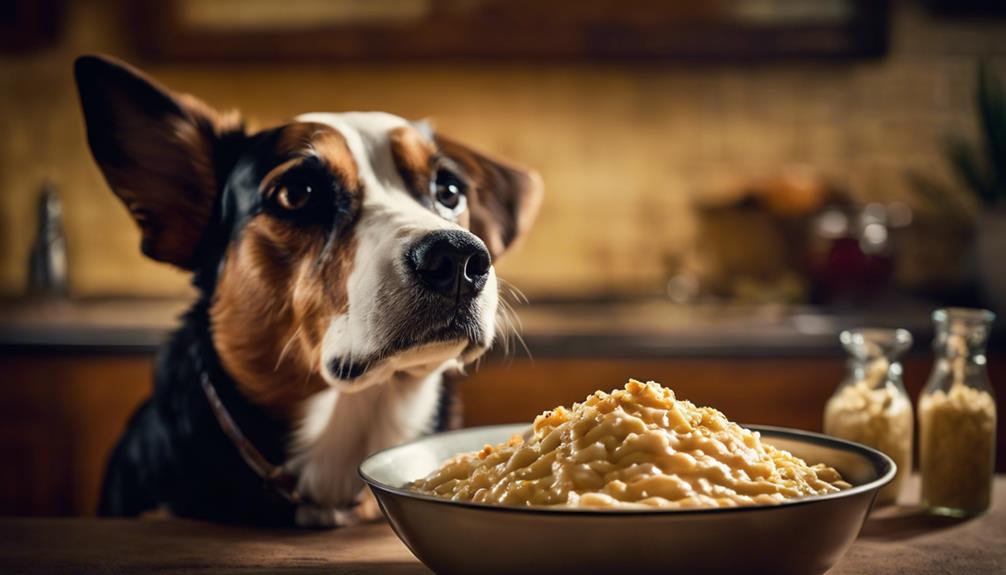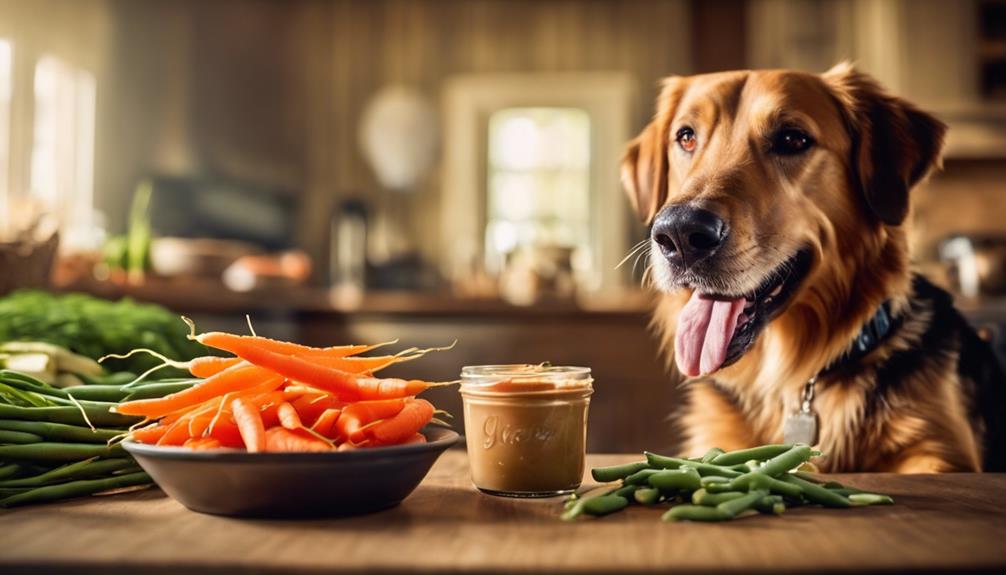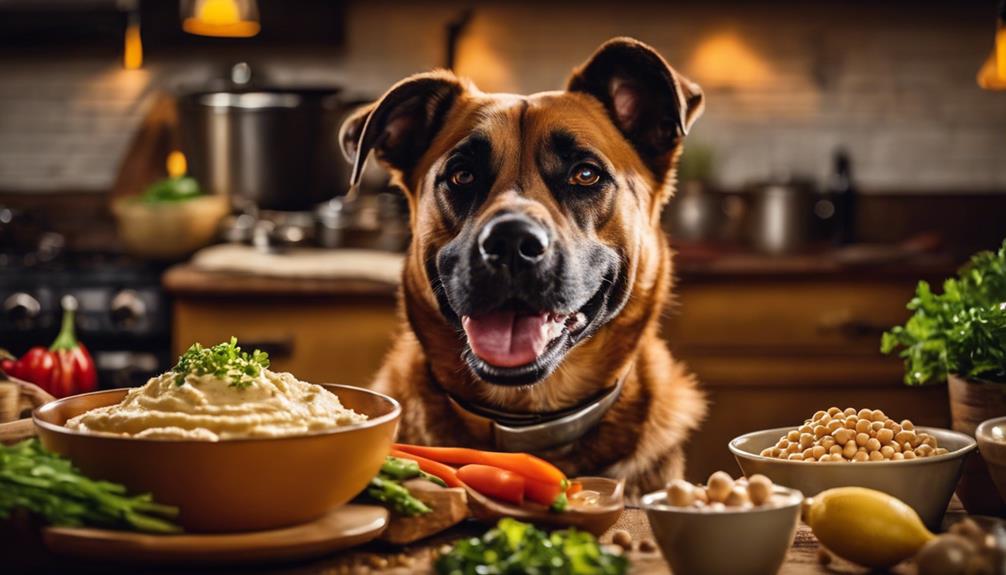Dogs and Hummus: Safety Explained
It’s not a good idea to give hummus to dogs because it often contains garlic and onion, which harm them. Even small amounts of these ingredients can cause serious health problems like stomach upset and anemia, which happens when red blood cells are destroyed.
Ingredients like lemon juice and salt can also lead to dehydration and salt poisoning. Keeping hummus out of your dog’s diet is crucial for their health. There are much safer and healthier alternatives that can ensure your pet stays well without facing these risks.
These alternatives can help maintain your dog’s balanced and safe nutritional plan.
Key Takeaways
- Garlic in hummus can harm dogs, causing anemia.
- Hummus’ salt content may lead to dog dehydration.
- Opt for dog-safe snacks like plain chickpeas instead.
Hummus Ingredients and Risks
Hummus, a favorite spread from the Middle East, includes ingredients like garlic, lemon juice, and various spices. These ingredients can be harmful to dogs, potentially leading to stomach issues and even toxicity. While hummus offers health benefits like fiber and protein for humans, it’s not safe for our canine friends because of the garlic and certain spices it contains. Garlic can be particularly dangerous for dogs, even in small amounts, leading to more harm than any potential benefit from homemade dish versions.
Adding lemon juice and salt to hummus can also increase the risk of dehydration and sodium ion poisoning in dogs. This makes it a risky food choice for them. Dog owners should avoid giving their pets hummus to prevent these health problems.
The Impact of Garlic and Onion

Giving dogs garlic and onion, even in tiny amounts like those in hummus, can cause serious health problems. These ingredients are harmful and can lead to stomach issues and anemia in dogs. The problem with garlic and onion is that they can destroy red blood cells, leading to anemia.
This makes it vital for dog owners to know about the dangers of feeding their pets any food that contains these ingredients. It’s all about keeping our canine companions safe by avoiding foods that could harm them.
Safe Alternatives for Dogs

Given the health risks of feeding dogs hummus, mainly because of its garlic and onion content, it’s crucial to find safe and nutritious alternatives. Dogs shouldn’t eat foods that could harm them.
Plain Chickpeas are a great choice because they contain protein and fiber. Ensure they’re unsalted and thoroughly cooked before giving them to your dog.
Unsweetened Yogurt is another excellent option, offering digestive health benefits thanks to its probiotics. Ensure it’s plain and free from xylitol, a sweetener dangerous for dogs.
Cooked sweet potatoes are also beneficial, containing vitamins A and C. They should be prepared without added spices or sugar to be safe for canine consumption.
These alternatives are not only healthier for dogs, but they also avoid the dangers found in traditional hummus ingredients.
Homemade Hummus Recipes

Given the health risks posed by traditional hummus ingredients like salt, garlic, and onions to dogs, it’s essential to look for safe alternatives. A simple and nutritious solution is making homemade hummus using chickpeas, water, and a little olive oil. This basic recipe avoids ingredients toxic to dogs and is a healthy snack or food topping for them.
Consider adding dog-safe herbs such as parsley or basil to make this hummus more appealing to dogs. These herbs boost the flavor without posing any danger. Garlic is harmful to dogs, so it’s crucial to leave it out of any hummus recipe intended for canine consumption. This approach ensures your dog can enjoy a tasty treat without any health risks.
Responding to Hummus Ingestion

If your dog has accidentally eaten hummus, acting quickly is essential. Hummus often contains garlic, which harms dogs and can cause gastrointestinal issues.
Watch for signs like vomiting or diarrhea. If you see these symptoms, they might react badly to the hummus. Dogs shouldn’t have garlic since it’s part of the Allium family, which is toxic to them.
To help with stomach upset, you can give them medications approved by your vet, such as Pepcid A.C. or Pepto-Bismol. Keeping your dog hydrated is also crucial if they’re vomiting or have diarrhea.
If symptoms don’t improve, talk to a vet. They can provide advice and treatment to prevent more severe issues like anemia from garlic toxicity. Taking these steps right away can help minimize the adverse effects of hummus on your dog.
Frequently Asked Questions
What Happens if My Dog Eats Hummus?
- Dogs may suffer digestive issues from hummus, garlic, and onion.
- High salt and lemon juice can worsen a dog’s health.
- Garlic poisoning and onion toxicity are serious risks after ingestion.
Are Chickpeas Safe for Dogs?
- Cooked chickpeas are safe in small amounts.
- Beware of allergies and stomach issues.
- Never give dogs raw chickpeas.
Is Tahini OK for Dogs?
- Tahini may cause digestive issues and pancreatitis in dogs.
- Dogs can have allergies to tahini; caution is advised.
- Opt for safer treats over tahini-based homemade snacks.
Can Dogs Eat Baba Ganoush?
- Eggplant in Baba Ganoush is toxic to dogs.
- Garlic poses health risks for dogs.
- High-fat content disrupts dogs’ diets.

